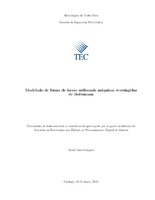Modelado de forma de larvas utilizando máquinas restringidas de Boltzmann
Abstract
Occlusion and presence of incomplete shapes on digital images of vermiform structures as
larvae make the automated process for larvae counting and segmentation hard to complete.
The suggested solution provides a method that considers the partial shape taken from an
image to generate the larva border according to the global and local information previously
learned from the available data. Occlusion is a particular case of incomplete shapes so it
is considered indirectly as well.
The main goal of this work is to develop a shape model that includes global and local
information of larvae’s structure, being at the same time rotation, translation and scale
invariant. The suggested solution uses the contour or boundaries of a larva to create fixed
size overlapped slices that are later passed through a principal component analysis (PCA)
block. Subsequently a scale change and Gray code numeric system is applied over each
slice to be finally processed by a Restricted Boltzmann Machine (RBM) or a set of them
using Deep Learning. This method involves two stages: training and evaluation of the
RBM. After training the RBM with slices corresponding to complete larvae the RBM’s
output will correspond to the best complete larvae that best describes the join probability
distribution of the inputs according to the distribution learned during the training stage,
even if the inputs correspond to incomplete or overlapped larvae.
Description
Proyecto de Graduación (Maestría en Electrónica) Instituto Tecnológico de Costa Rica, Escuela de Ingeniería Electrónica, 2015.


